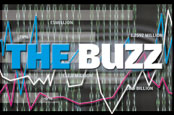
Is this issue a live debate, or are the chattering classes broadcasting to themselves and talking us all into recession?
Since the beginning of the year, the focus of the debate has changed more than once (see chart below); from inflation (January-March) to the credit crunch (April) and back to inflation (May-June).
So far, July promises to be an unusual month, as the debate has now swung to focus much more on recession and house prices. As share-of-influence weights each voice in the debate according to its actual influence on the topic analysed, it is a strong leading indicator of the general public's focus, be it on issues or brands.
Source: Onalytica
Several all too real indicators signal that UK Plc is slowing down, so Jam looked at the buzz among those writing about the UK economy.
One of the first things to note in the chart below is the huge spike on 23 May. This coincided with release of data showing that year-on-year economic growth had slowed to 2.5%, its slowest rate in three years, while all writing about the economy was consistently negative.
Source: Onalytica
Who is leading this increasingly gloomy analysis of the UK economy? Primarily, people are looking to mainstream media for news and information. The chart below shows the top five influential media in the debate on the UK economy.
Publication Relative Weight (influence)
- BBC - 22
- Guardian - 21
- Telegraph - 17
- FT - 9
- Daily Mail - 7
Source: Onalytica
What is striking is the total dominance of large and traditional media sources, and Jam found this was consistent throughout the top 20 list. The first blog to register comes in at number 29 (on telegraph.co.uk) and the most influential independent blog is at number 54 (ps: women readers, in particular, might want to comment on his 29 June post).
Given the complexity and breadth of issues around the economy (and the primacy of facts and statistics over opinion), perhaps it is inevitable that this story is being written by the mainstream media.
However, the economy is a pretty abstract concept for most people; they're more concerned about finding the money to fill the tank of their 4x4 (with biofuel, naturally).
But abstract or not, the rapid decline in sales at Marks & Spencer, Tesco's promotion of "inflation busting" offers and wider talk about de-premiumisation and downshifting all suggest that consumers aren't just listening or talking - they're acting and acting now.
Just how rapidly this is occurring is suggested by an additional point tracked by Jam: the value retailers Aldi and Lidl have seen month-on-month gains in buzz in excess of 100% (May to Jun '08) taking their levels to equal those of Waitrose. During this period even Tesco fell, declining 11%. What starts as buzz rapidly transmits into shifts in shopping habits, purchase preferences and ultimately profits.
So it would appear that established media outlets (on and offline) are leading the agenda; explaining the wider economic context UK Plc is battling within - and they are being increasingly negative about the situation. The public, on the other hand, sees the debate in rather more visceral and personal terms: "how does it affect me!" People are starting to look and talk about ways to save money and change their behaviour. Brands could and should take note.
Methodology
Jam, the social media unit from i-level, used data from buzz analytics firm Onalytica to track conversations across the web. Influence is a weight, which is calculated by analysing the structure of references between all participants in the debate.
To suggest topics for The Buzz: Word of Mouth e-mail rich.sutcliffe@haymarket.com

/

